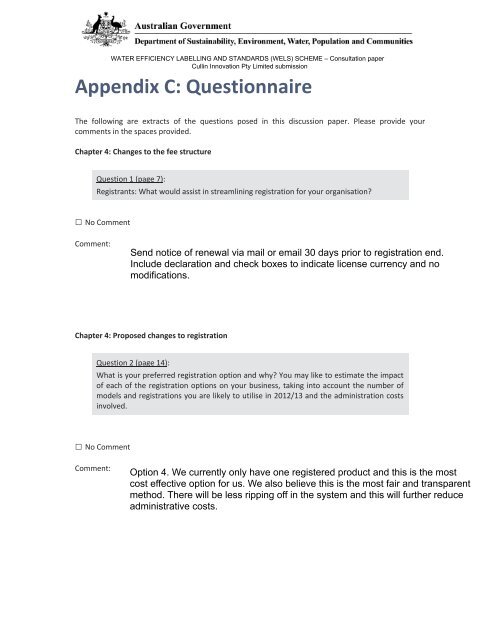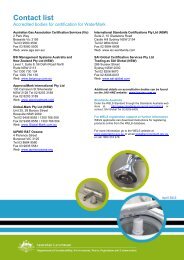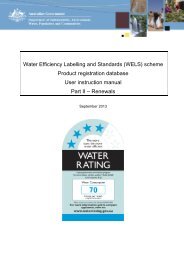Appendix C Questionnaire
Cullin Innovation Pty Ltd (PDF - 1.18 MB) - Water Efficiency ...
Cullin Innovation Pty Ltd (PDF - 1.18 MB) - Water Efficiency ...
- No tags were found...
Create successful ePaper yourself
Turn your PDF publications into a flip-book with our unique Google optimized e-Paper software.
WATER EFFICIENCY LABELLING AND STANDARDS (WELS) SCHEME – Consultation paper<br />
Cullin Innovation Pty Limited submission<br />
<strong>Appendix</strong> C: <strong>Questionnaire</strong><br />
The following are extracts of the questions posed in this discussion paper. Please provide your<br />
comments in the spaces provided.<br />
Chapter 4: Changes to the fee structure<br />
Question 1 (page 7):<br />
Registrants: What would assist in streamlining registration for your organisation?<br />
□ No Comment<br />
Comment:<br />
Send notice of renewal via mail or email 30 days prior to registration end.<br />
Include declaration and check boxes to indicate license currency and no<br />
modifications.<br />
Chapter 4: Proposed changes to registration<br />
Question 2 (page 14):<br />
What is your preferred registration option and why? You may like to estimate the impact<br />
of each of the registration options on your business, taking into account the number of<br />
models and registrations you are likely to utilise in 2012/13 and the administration costs<br />
involved.<br />
□ No Comment<br />
Comment:<br />
Option 4. We currently only have one registered product and this is the most<br />
cost effective option for us. We also believe this is the most fair and transparent<br />
method. There will be less ripping off in the system and this will further reduce<br />
administrative costs.
Question 3 (page 14):<br />
If your preference is for option 3 (product sub-categories), are the proposed subcategories<br />
in Table 4.3 on page 12 appropriate? Can you suggest how the sub-categories<br />
can be made more relevant?<br />
□ No Comment<br />
Comment:<br />
We support option 4<br />
Question 4 (page 14):<br />
Do all products that you sell have a unique code? For businesses that do not<br />
employ a unique code for their products, does this create difficulties? In your<br />
opinion, what is the most effective way to separately identify individual<br />
models/variants registered under the WELS scheme?<br />
□ No Comment<br />
Comment:<br />
Every product we sell has a unique name and code.<br />
It is our opinion the most effective way to separately identify<br />
product is by product name and code.<br />
Question 5 (page 15):<br />
Is there a need for sets of minor products under the new arrangements?<br />
Why/why not?<br />
□ No Comment<br />
Comment:<br />
Sets of minor products will be difficult to administer and will only add to<br />
administrative costs.
Question 6 (page 15):<br />
Do you supply sets of minor products? If so, what percentage of your business<br />
do these products constitute?<br />
□ No Comment<br />
Comment:<br />
No. We do not sell sets of minor products.<br />
Question 7 (page 15):<br />
Are the criteria for sets of minor products appropriate? If no, please provide<br />
reasons.<br />
□ No Comment<br />
Comment:<br />
We think the criteria are ok but the category is unnecessary and not cost<br />
effective if option 4 is adopted.
Question 8 (page 16):<br />
Do you have a preference for a particular renewal system - fixed (e.g. annual)<br />
or flexible (e.g. 1, 2 and 3 years)? Why?<br />
□ No Comment<br />
Comment:<br />
We would prefer a flexible 1, 2 or 3-year option. This gives the option to pay the<br />
fee that is best matched to the products likely life cycle or modification<br />
requirements.<br />
Question 9 (page 17):<br />
For transitioning to the new fee arrangements, do you prefer that registrations<br />
commence from the date of inception of the new scheme, or an option that staggers<br />
commencement of new registrations?<br />
□ No Comment<br />
Comment:<br />
We would prefer to transition to the new fee arrangement by staggering the<br />
commencement to the date of first registration.
Question 10 (page 18):<br />
Which of the two options for treatment of existing fees at the commencement of the new scheme do<br />
you consider the most appropriate and/or administratively straightforward for you? Why?<br />
a) Existing fees are pro-rata credited and the total amount returned is collected through higher fees,<br />
or<br />
b) Existing fees are not credited to individual registrants, but their retention used to lower fees.<br />
□ No Comment<br />
Comment:<br />
We consider the existing fees are pro-rate credited and the total amount<br />
credited is collected through higher fees.<br />
Question 11 (page 20):<br />
What is your preference for grandfathering provisions, and why? Should grandfathering<br />
be indefinite, with the Minister able to specify a date of ‘no further supply’, or should<br />
there be a specified period of grandfathering after the WELS standard is changed?<br />
□ No Comment<br />
Comment:<br />
We recommend there is a specified period of grandfathering with the minister<br />
being able to extend the period on a case-by-case basis.
Question 12 (page 20):<br />
Should flow controllers be removed from the WELS scheme or should<br />
registration of these products become mandatory? Please provide reasons for<br />
your answer.<br />
□ No Comment<br />
Comment:<br />
We consider it should be mandatory for flow controllers to be registered.<br />
Flow controllers are often used in shower roses and can potentially be the<br />
week link in the chain.<br />
Chapter 5: Proposed changes to compliance and administration of the WELS scheme<br />
Question 13 (page 22):<br />
Is there anything else you would like to see for WELS compliance (e.g. new<br />
penalties or offences and different compliance responses)?<br />
□ No Comment<br />
Comment:<br />
Having every individual product clearly identified with a name and unique<br />
number will make infringement much easier to detect. Civil action will be<br />
more cost effective and provide a better deterrent.
Question 14 (page 22):<br />
What do you think of the current level and focus of WELS compliance<br />
activities?<br />
□ No Comment<br />
Comment:<br />
If no one has been penalized as yet manufacturers and sellers<br />
will remain blasé.<br />
Question 15 (page 23):<br />
Do you agree with the requirement that all advertising for WELS products must<br />
have WELS information? If yes, why?<br />
□ No Comment<br />
Comment:<br />
Yes I agree strongly that all advertising for WELS products must have WELS<br />
information. Many consumers make their decision to by solely based on<br />
advertising. When they get to the shop they may find the product is not the best<br />
rated product but they are emotionally committed to purchase it anyway.
Question 16 (page 23):<br />
Is there another way to monitor the advertising requirement? If yes, how?<br />
X□ No Comment<br />
Comment:<br />
Question 17 (page 24):<br />
How do you access registration information about products (e.g. through the<br />
Gazette, through the public database or otherwise)?<br />
□ No Comment<br />
Comment:<br />
Public database.<br />
Question 18 (page 24):<br />
Where would you like to access registration information about products? Why?<br />
□ No Comment<br />
Comment:<br />
Public database. It is logical and easy to navigate.
Chapter 6: Other proposed changes and further scheme development<br />
Question 19 (page 25):<br />
Do you support the ability of WELS inspectors to enter premises without paying a fee if<br />
there is one?<br />
□ No Comment<br />
Comment:<br />
Yes<br />
Question 20 (page 25):<br />
Do you support more extended holding of evidentiary material? Why or why not?<br />
□ No Comment<br />
Comment:<br />
No. The matter needs to be resolved quickly. If an entire shipment is in dispute<br />
this can have a significant impact on a business cash flow.
Question 21 (page 26):<br />
How much detail of alleged breaches do you think should be publicised?<br />
□ No Comment<br />
Comment:<br />
All of the above.<br />
Question 22 (page 27):<br />
Do you support follow-up check testing being at the cost of the registrant of the ‘failed’<br />
product? Why or why not?<br />
□ No Comment<br />
Comment:<br />
We support follow up check testing being at the cost of the registrant of failed<br />
products, provided WELS reimburse the registrant it the product is subsequently<br />
found to be compliant.
Question 23 (page 27):<br />
Do you have any concerns about any ‘person’ being able to apply for registration of a<br />
WELS product provided they can supply required test results, WaterMark certification<br />
etc? If yes, please outline your concerns.<br />
□ No Comment<br />
Comment:<br />
Yes. Our main concern is that it removes the link between the owners of the<br />
intellectual property and the manufacturer. There are many examples of<br />
factories making extra product and selling to mates at reduced cost. It is<br />
important for us that the person seeking registration discloses their<br />
manufacturer and proves they have the right to register and sell the product.<br />
Question 24 (page 27):<br />
Do you think the WELS Regulator should have any specific functions? Why or why not?<br />
X□ No Comment<br />
Comment:<br />
Question 25 (page 28):<br />
Do you have any concerns about information sharing between WELS and other<br />
government agencies? If yes, please provide details.<br />
□ No Comment<br />
Comment:<br />
No
Question 26 (page 28):<br />
Does the definition of ‘supply’ also need to cover any other aspects? If yes, please provide<br />
details?<br />
X□ No Comment<br />
Comment:<br />
Question 27 (page 28):<br />
Have you experienced any issues with the current definition of ‘supply’? If yes, in what<br />
instances.<br />
□ No Comment<br />
Comment:<br />
No
Question 28 (page 29):<br />
Do you consider that WELS should be more closely aligned with WaterMark and/or the E3<br />
energy rating scheme? Please provide justifications for your response.<br />
□ No Comment<br />
Comment:<br />
WELS should be more closely aligned with WaterMark because they both deal<br />
with water. E3 should remain separate. Consumers purchase white goods for<br />
different reasons. Such as people on tank water that use mains electricity will<br />
have a different priority to someone on mains water but using a generator or<br />
solar for power etc. The efficiency of the water and power should be indicated<br />
separately.<br />
Question 29 (page 29):<br />
Should the scheme be eventually split between plumbing and whitegoods products and if<br />
so, in what timeframe?<br />
□ No Comment<br />
Comment:<br />
Yes. ASAP<br />
Question 30 (page 29):<br />
Do you see value in a single ‘sustainability’ label? Why? Who would derive the most<br />
benefit from such a label?<br />
□ No Comment<br />
Comment:<br />
The water and power labels should be kept separate. Consumers purchase white<br />
goods for different reasons. Such as people on tank water that use mains<br />
electricity will have a different priority to someone on mains water that use a<br />
generator or solar for power etc. The cost of water and power will not rise<br />
proportionally.
Question 31 (page 30):<br />
Please provide any other comments or suggestions that you would like to make about<br />
improving the WELS scheme.<br />
□ No Comment<br />
Comment:<br />
Thanks for the opportunity for input.




